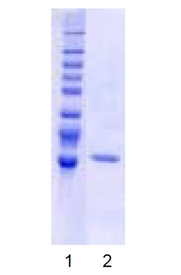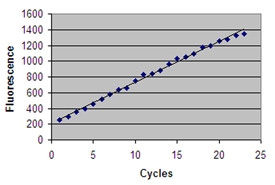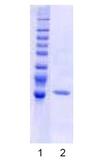Product Details
| Alternative Name: | Ubiquitin-specific protease 2 |
| |
| MW: | ~40kDa |
| |
| Source: | Produced in E. coli BL21 (λDE3). Untagged USP2 catalytic domain. |
| |
| UniProt ID: | Q5U349 |
| |
| Formulation: | Liquid. In 10mM MES, 0.5mM DTT, 50mM TRIS-HCl, pH 7.5, containing 20% glycerol. |
| |
| Purity: | ≥95% (SDS-PAGE, following ion exchange chromatography) |
| |
| Application Notes: | Uses:
Deubiquitinylation assays using small molecule substrates (e.g. Ub-AMC) or ubiquitin-protein conjugates.
Studies of the interaction of USP2 with FAS1 and their role in prostate cancer.
Development of inhibitors for USP2 deubiquitinylating activity. |
| |
| Shipping: | Dry Ice |
| |
| Long Term Storage: | -80°C |
| |
| Handling: | Avoid freeze/thaw cycles. After opening, prepare aliquots and store at -80°C. |
| |
| Scientific Background: | Ubiquitin-specific proteases (USPs) represent the most widespread and represented deubiquitinylating enzymes across evolution. USPs tend to release ubiquitin from a conjugated protein. They display similar catalytic domains but divergent N-terminal and occasionally C-terminal extensions, which are thought to function in substrate recognition, subcellular localization, and protein-protein interactions.
USP2 is a ubiquitin-specific protease thought to function at the pre-proteasomal level by preventing the degradation of fatty acid synthase (FAS). FAS overexpression occurs in the majority of epithelial tumors, including prostate cancer, and protects cancer cells from apoptosis. Because USP2 is overexpressed in prostate cancer and its inhibition results in apoptosis of transformed prostatic cells, this isopeptidase is a potential target for induction of apoptosis in prostate cancer cells.
The full length USP2 protein is comprised of 618 amino acids with a predicted molecular mass of 69.4 kDa and contains the highly conserved Cys and His boxes present in all members of the UBP family of deubiquitinylating enzymes. The N-terminal region (residues 271-618) of USP2 contains all the necessary residues for catalysis and exhibits deubiquitinylating activity vs. ubiquitin-AMC (Prod. No. BML-SE211). |
| |
| Regulatory Status: | RUO - Research Use Only |
| |

Coomassie stained gel of USP2 catalytic domain (UW9850). Lane 1: MW markers (top to bottom) 205, 116, 97, 84, 66, 55,45 and 36. Lane 2: UW9850 (2ug).

Example of assay result. DUB assay: 50 nM USP2 catalytic domain (BML-UW9850); 500nM Ubiquitin-AMC; 50mM HEPES, pH 7.8, 0.5mM EDTA, 1mM DTT
Please mouse over
Product Literature References
Serine 25 phosphorylation inhibits RIPK1 kinase-dependent cell death in models of infection and inflammation: Y. Dondelinger, et al.; Nat. Commun.
10, 1729 (2019),
Abstract;
Full Text
Broad utility of an affinity-enrichment strategy for unanchored polyubiquitin chains: J. Strachan, et al.; J. Proteomics Bioinform.
S7, 001 (2013),
Full Text
Related Products















